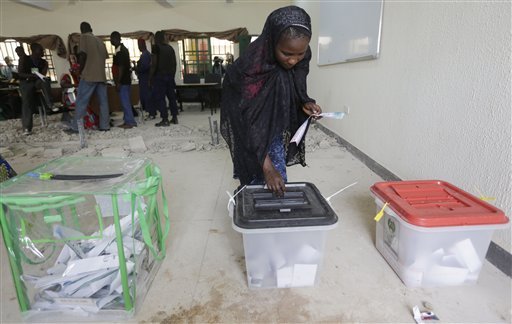ABUJA, Nigeria — Nigeria has extended voting to Sunday after problems occurred as millions turned out Saturday to vote in a presidential election that analysts say is too close to call between President Goodluck Jonathan and former military dictator Muhammadu Buhari.
The polling will continue Sunday in some areas where new machines were not reading voters' biometric cards, said Kayode Idowu, spokesman of the Independent National Electoral Commission. The areas where voting will be extended include Lagos, Nigeria's largest city on the Atlantic coast.
In other areas, vote counting has already begun, he said.
Nearly 60 million people have cards to vote and determine the outcome of the first election in Nigeria's history where an opposition candidate has a realistic chance of defeating a sitting president. The vote takes place amid an Islamic insurgency in Nigeria's northeast in which thousands have been killed.
Boko Haram extremists waving guns forced voters to abandon polling stations in three villages of northeastern Gombe state, witnesses said. The militants have vowed to disrupt elections, calling democracy a corrupt Western concept.
Two car bombs exploded at two polling stations in southeast Enugu state but did not hurt voters, police said. Police detonated two other car bombs at the scene of the first explosion, a polling station set up at a primary school, said Enugu state police Commissioner Dan Bature. Boko Haram has been blamed for many car bombings but was not immediately suspected in the southeastern blasts far from its northeast stronghold.
President Goodluck Jonathan denied the attacks, saying the state governor told him there were no blasts.
The oil-rich and heavily populated south is deeply contested and has become a political battleground since the main opposition parties united in a coalition two years ago, causing dozens of defections from Jonathan's party.
The official website of the Independent National Electoral Commission was hacked but was quickly secured, said officials who said the site holds no sensitive material.
Thousands of people forced from their homes by the Islamic uprising lined up to vote at a refugee camp in Yola, capital of northeast Adamawa state, which is hosting as many refugees as its 300,000 residents.
Registration to vote began late in most places, delaying the scheduled start of voting in the afternoon. Men and women formed separate lines at many polling stations.
Earlier, officials rushed across the country delivering ballot materials by trucks, speedboats, motorcycles, mules and even camels, in the case of a northern mountaintop village.
Good humor turned to anger and altercations as people waited hours and temperatures rose up to 100 degrees (37 degrees Celsius) to be registered to vote, only to find that machines were not reading new biometric voting cards.
Even the president was affected. Three newly imported card readers failed to recognize the fingerprints of Jonathan and his wife. He returned two hours later and was accredited without the machine using visual identification. Biometric cards and readers are being used for the first time to discourage the kind of fraud that has marred previous votes.
